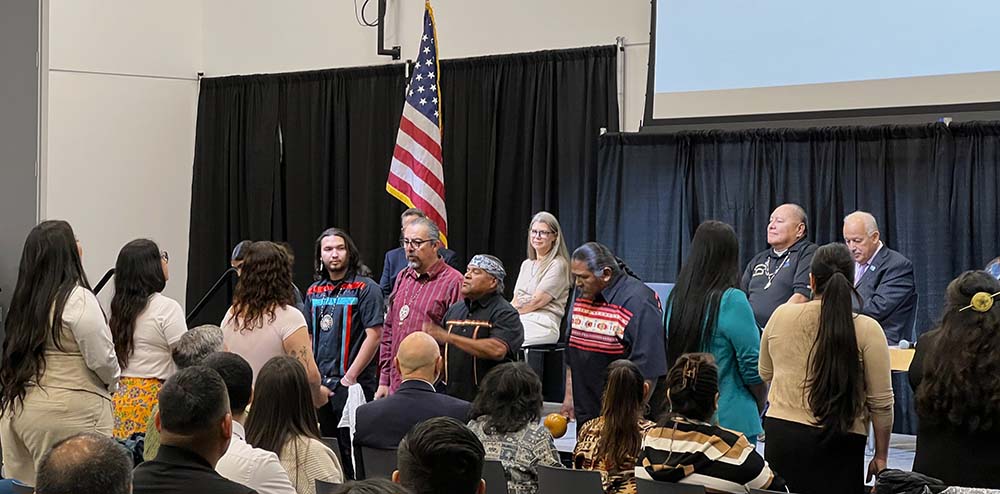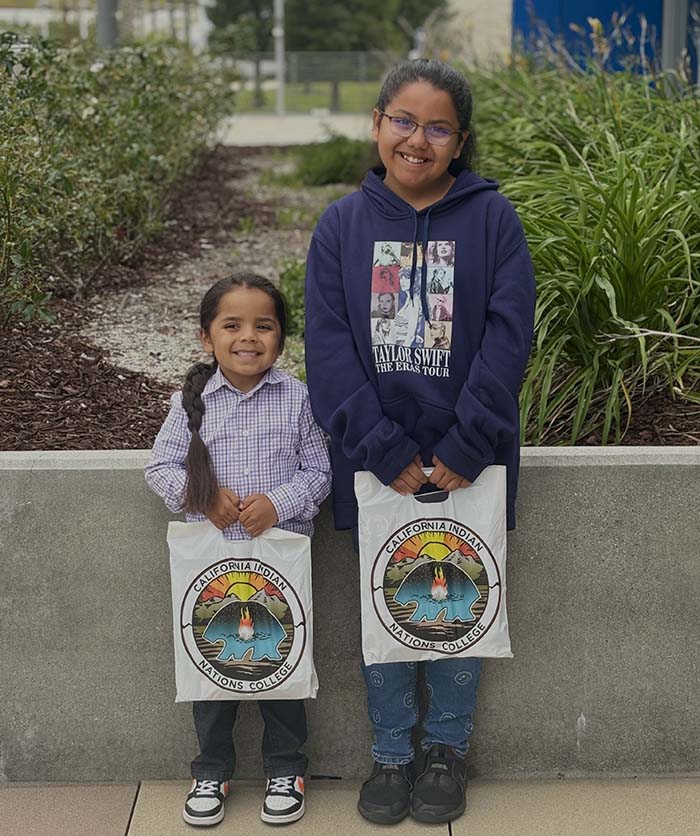
- Details
- By California Indian Nations College
California Indian Nations College (CINC), in collaboration with Kumeyaay Community College (KCC) and the White House Initiative on Advancing Educational Equity, Excellence, and Economic Opportunity for Native Americans and Strengthening Tribal Colleges and Universities (White House Initiative), hosted its inaugural Native American/Indigenous Education Summit on March 22-23, 2024. The event took place inside the Santos Manuel Student Union Building at California State University of San Bernardino (CSUSB).
Federal officials, state officials, local officials, and members of tribal governments were invited to attend the VIP Dinner on Friday, March 22, 2024. Elder Henry Vasquez played the traditional flute as the honored guests arrived. Land acknowledgments and a traditional blessing were conducted by Elder Kim Marcus, with hints of the sweet scent of tobacco wafting through the room as guests settled into their seats to hear from speakers.

President Tomas Morales of CSUSB welcomed everyone to the campus as the dinner started with a brief history of Tribal Colleges & Universities (TCUs) and the challenges they have endured. The audience heard a Federal Address from Naomi Miguel Executive Director of the White House Initiative on Advancing Educational Equity, Excellence, and Economic Opportunity for Native Americans and Strengthening Tribal Colleges and Universities; a State Address by Assembly Member Ramos; and a Sponsoring Tribes Address from Secretary- Treasurer & CINC Alumni Savana R. Saubel of Agua Caliente Band of Mission Indians. Representatives from sponsoring tribes who offered remarks include Vice Chairman Johnny Hernandez, Jr. of the San Manuel Band of Mission Indians, and CINC Board Secretary Dineen Mike of Twenty-Nine Palms Band of Mission Indians.
The dinner, catered by the CSUSB culinary department, allowed time for dignified guests such as Senator Roth to engage in conversation with CINC alumni and students. Students introduced themselves and shared their academic journey. Their testimonies shared the positive experiences of attending a TCU and emphasized how a culturally responsive curriculum in higher education promotes a sense of community, belonging, inclusivity, and respect for their identity, which has assisted them in achieving their academic ambitions. During his closing recap, Super Intendant Tony Thurmond shared a personal experience with education and languages to highlight the importance of inclusivity and truthful telling of history in education.
Saturday, March 23, 2024, brought more educators, students, community members, and VIP Dinner guests to delve into these topics in breakout sessions. The Summit’s goal was to provide information on "The State of Indian Education in California and Beyond," "Why Aren't There More? The Challenges to Starting a Tribal College," and "Why Tribal Colleges Play a Vital Role in Empowering Native Communities." Topics included Census & Identity, Cultural Responsivity (Curricula & Student Support), and Equitable Access to Higher Education. California is home to 1.4 million people who identify either fully or partially as Native American, one of the largest populations of Native Americans in the Nation, yet it has zero accredited TCU’s. Native students are four times more likely to achieve their bachelor’s degrees attending a TCU and experience high dropouts in mainstream institutions. Native American & Indigenous students shared with leadership why they chose a TCU, why it was successful, encouraged removing obstacles for emerging TCUs, and provided testimonies. TCUs are successful by embracing culture, inclusivity, and identity, and with Federal, State, Local, and Tribal legislators' support, they will be able to continue to educate, strengthen, and empower Native and non-Native students for the benefit of our communities.
Help us defend tribal sovereignty.
At Native News Online, our mission is rooted in telling the stories that strengthen sovereignty and uplift Indigenous voices — not just at year’s end, but every single day.
Because of your generosity last year, we were able to keep our reporters on the ground in tribal communities, at national gatherings and in the halls of Congress — covering the issues that matter most to Indian Country: sovereignty, culture, education, health and economic opportunity.
That support sustained us through a tough year in 2025. Now, as we look to the year ahead, we need your help right now to ensure warrior journalism remains strong — reporting that defends tribal sovereignty, amplifies Native truth, and holds power accountable.
 The stakes couldn't be higher. Your support keeps Native voices heard, Native stories told and Native sovereignty defended.
The stakes couldn't be higher. Your support keeps Native voices heard, Native stories told and Native sovereignty defended.
Stand with Warrior Journalism today.
Levi Rickert (Potawatomi), Editor & Publisher
